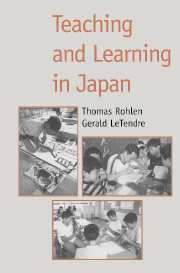Crossref Citations
This Book has been
cited by the following publications. This list is generated based on data provided by Crossref.
LeTendre, Gerald K.
1995.
Disruption and Reconnection: Counseling Young Adolescents in Japanese Schools.
Educational Policy,
Vol. 9,
Issue. 2,
p.
169.
Larsson, Yvonne
Booth, Martin
and
Matthews, Richard
1998.
Attitudes to the Teaching of History and the use of Creative Skills in Japan and England: a comparative study.
Compare: A Journal of Comparative and International Education,
Vol. 28,
Issue. 3,
p.
305.
Dien, Dora Shu-fang
1999.
Chinese Authority-Directed Orientation and Japanese Peer-Group Orientation: Questioning the Notion of Collectivism.
Review of General Psychology,
Vol. 3,
Issue. 4,
p.
372.
Fülöp, Marta
2000.
Teachers' Perception of the Role of Competition in Their Country: Hungary, Japan and the USA.
Citizenship, Social and Economics Education,
Vol. 4,
Issue. 3,
p.
142.
Strom, Robert D.
Strom, Shirley K.
Strom, Paris S.
Makino, Katsuko
and
Morishima, Yukiko
2000.
Perceived Parenting Success of Mothers in Japan*.
Journal of Family Studies,
Vol. 6,
Issue. 1,
p.
25.
LeTendre, Gerald K.
Baker, David P.
Akiba, Motoko
Goesling, Brian
and
Wiseman, Alex
2001.
Teachers’ Work: Institutional Isomorphism and Cultural Variation in the U.S., Germany, and Japan.
Educational Researcher,
Vol. 30,
Issue. 6,
p.
3.
Galan, Christian
2001.
L’enseignement de la lecture au Japon.
Harkins, Linda F.
2001.
Understanding the Acculturation Process forKaigaishijo.
The Educational Forum,
Vol. 65,
Issue. 4,
p.
335.
Letendre, Gerald K
and
Akiba, Motoko
2001.
Teacher Beliefs about Adolescent Development: Cultural and organizational impacts on Japanese and US middle school teachers' beliefs.
Compare: A Journal of Comparative and International Education,
Vol. 31,
Issue. 2,
p.
187.
Kreitz-Sandberg, Susanne
2002.
Jugendliche in Japan und Deutschland.
p.
1.
Brown, Steven
2002.
Is Rereading more Effective than Prereading?.
RELC Journal,
Vol. 33,
Issue. 1,
p.
91.
Tsuneyoshi, Ryoko
2004.
The New Japanese Educational Reforms and the Achievement “Crisis” Debate.
Educational Policy,
Vol. 18,
Issue. 2,
p.
364.
Howe *, Edward R.
2004.
Canadian and Japanese teachers' conceptions of critical thinking: a comparative study.
Teachers and Teaching,
Vol. 10,
Issue. 5,
p.
505.
Saito, Hiromi
and
Ebsworth, Miriam Eisenstein
2004.
Seeing English Language Teaching and Learning through the Eyes of Japanese EFL and ESL Students.
Foreign Language Annals,
Vol. 37,
Issue. 1,
p.
111.
Oshima, Jun
Oshima, Ritsuko
Murayama, Isao
Inagaki, Shigenori
Takenaka, Makiko
Nakayama, Hayashi
and
Yamaguchi, Etsuji
2004.
Design experiments in Japanese elementary science education with computer support for collaborative learning: hypothesis testing and collaborative construction.
International Journal of Science Education,
Vol. 26,
Issue. 10,
p.
1199.
Howe, Edward R.
2006.
Exemplary Teacher Induction: An international review.
Educational Philosophy and Theory,
Vol. 38,
Issue. 3,
p.
287.
Stevenson, Harold W
2006.
Encyclopedia of Cognitive Science.
Aun, Toh Kok
Riley, Joseph P.
Atputhasamy, Lourdusamy
and
Subramaniam, R.
2006.
School Science Achievement in Japan and Singapore: A Tale of Two Cities.
Educational Research for Policy and Practice,
Vol. 5,
Issue. 1,
p.
1.
Aspinall, Robert W.
2006.
Using the paradigm of ‘small cultures’ to explain policy failure in the case of foreign language education in Japan.
Japan Forum,
Vol. 18,
Issue. 2,
p.
255.
Burgess, Chris
2007.
‘Newcomer’ children in non-metropolitan public schools: the lack of state-sponsored support for children whose first language is not Japanese.
Japan Forum,
Vol. 19,
Issue. 1,
p.
1.



